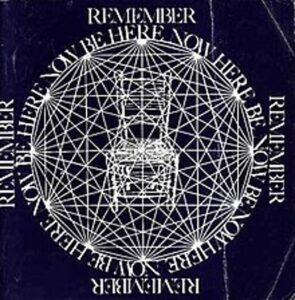Nearly every self-made billionaires are obsessed with learning. This video reveals the top to recommended books that had the biggest impact on these billionaires…
WATCH:
Summary of the 10 Top Recommended Books by Self-Made Billionaires…
#1 The Intelligent Investor – Benjamin Graham
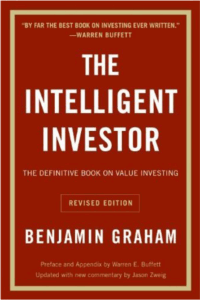
The # book that Warren Buffet claims to be the best book on investing (bar far), was The Intelligent Investor by Benjamin Graham. And, that chapters 8 and 20 were the bedrock of his investing strategy for many years.
First published in 1949, is a widely acclaimed book on value investing. The book provides strategies on how to successfully use value investing in the stock market.
Warren Buffet isn’t the only one who liked it…
Historically, the book has been one of the most popular books on investing and Graham’s legacy still remains with almost 40k Amazon positive recommendations on it’s Amazon book listing.
#2 Extraordinary Popular Delusion And The Madness of Crowds – Charles Mackay
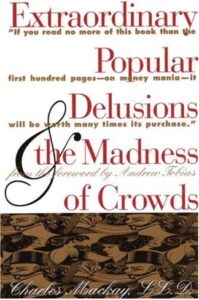
Sir John M. Templeton, a Tennessee-born investor and philanthropist who amassed a fortune in global stocks and gave away hundreds of millions of dollars in his life time.
Templeton was regarded as a contrarian investor and mutual fund manager who founded the Templeton Growth Fund in 1954, which eventually netted $13 billion in assets.
Turns out John’s favorite book was Extraordinary Popular Delusions and the Madness of Crowds,
First published in 1841, Extraordinary Popular Delusions and the Madness of Crowds is often cited as the best book ever written about market psychology.
The book covers the grand-scale madness, major schemes, and bamboozlement-and the universal human susceptibility to all three. This informative, funny collection encompasses a broad range of manias and deceptions, from witch burnings to the Great Crusades to the prophecies of Nostradamus.
#3 The Cather in the Rye – J.D. Salinger

Oddly enough, the book that changed Bill Gates life the most was the Cather and the RYE. He apparently found it fascinating.
The Catcher in the Rye is a novel by J. D. Salinger, partially published in serial form in 1945–1946 and as a novel in 1951. It was originally intended for adults, but is often read by adolescents for its themes of angst, alienation, and as a critique of superficiality in society.
About one million copies are sold each year, with total sales of more than 65 million books. The novel’s protagonist Holden Caulfield has become an icon for teenage rebellion. The novel also deals with complex issues of innocence, identity, belonging, loss, connection, sex, and depression.
Who knew?
#4 Be Here Now – Ram Dass
This was Steve Jobs most recommended book.
Be Here Now, is a 1971 book on spirituality, yoga, and meditation by the American yogi and spiritual teacher Ram Dass (born Richard Alpert). The core book was first printed in 1970 as From Bindu to Ojas and its current title comes from a statement his guide, Bhagavan Das, made during Ram Dass’s journeys in India.
Basically, Be Here Now is one of the first guides for those not born Hindu to becoming a yogi. For its influence on the hippie movement and subsequent spiritual movements, it has been described as a “countercultural bible” and “seminal” to the era. It encourages readers to let go of themselves.
#5 Life is What You Make It – Peter Buffett
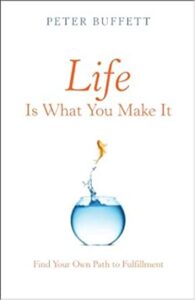
James Dimon is an American billionaire businessman and banker who has been the chairman and chief executive officer of JPMorgan Chase, the largest of America’s 4 biggest banks.
The book he recommends as the most influential in his readings was: Life is What You Make It. The book is a story of love, hope and how determination can overcome destiny and to find your own path to fulfillment.
From composer, musician, and philanthropist Peter Buffett comes a warm, wise, and inspirational book that asks, Which will you choose: the path of least resistance or the path of potentially greatest satisfaction?
#6 Things Hidden Since the Foundation of the World – Rene Girard
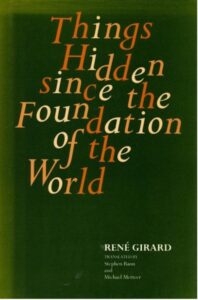
Founder of Pay Pal, billionaire Peter Theil’s top book pick was Things Hidden Since the Foundation of the World. Theil once claimed he was blown away by the author’s philosophy that will completely change your perspective on the world.
An astonishing work of cultural criticism, this book is widely recognized as a brilliant and devastating challenge to conventional views of literature, anthropology, religion, and psychoanalysis.
Girard’s point of departure is what he calls “mimesis,” the conflict that arises when human rivals compete to differentiate themselves from each other, yet succeed only in becoming more and more alike. At certain points in the life of a society, according to Girard, this mimetic conflict erupts into a crisis in which all difference dissolves in indiscriminate violence.
#7 My Inventions: The Autobiography of Nikola Tesla – Nikola Tesla
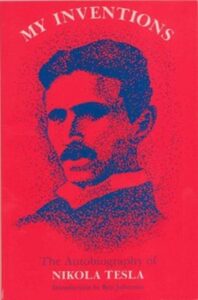 This is the favorite book by Google’s founder Larry Page. The book is a biography of the genius electrical inventor. My Invention’s is an autobiography of the reclusive, brilliant engineer who:
This is the favorite book by Google’s founder Larry Page. The book is a biography of the genius electrical inventor. My Invention’s is an autobiography of the reclusive, brilliant engineer who:
Invented the Niagra power system that made Edison’s obsolete. Sold Westinghouse 40 patents that broke a General Electric monopoly. He discovered the radio methods that Marconi converted into a fortune. Built a radio-guided torpedo before Ford ended the horse-and-buggy era. Tesla attempted, with J.P. Morgan’s backing, to change the earths electric charge!
#8 The Idea Factory. Bell Labs and the Great Age of American Innovation – Jon Gertner
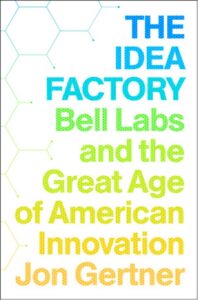
Facebook’s Mark Zuckerberg is a lover of books. The one he love the most? Bell Labs and the Great Age of American Innovation which describes the history of Bell Labs, the research and development wing of AT&T, as well as many of its eccentric personalities, such as Claude Shannon and William Shockley. The book explains how Bell Labs was influential in be the incubator for scientific innovation from the 1920’s through the 1980’s.
Their growth concepts still propel many of today’s most exciting technologies.
#9 The Effective Executive: The Definitive Guide to Getting the Right Things Done – Peter Drucker
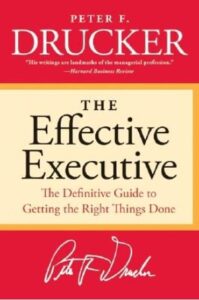
Not surprisingly, the founder of the world’s largest bookstore and billionaire Jeff Bezos is a huge reader of books. His recommended reading; The Effective Executive: The Definitive Guide to Getting the Right Things Done.
What makes an effective executive? That’s what the whole book is about.
The measure of the executive, Drucker reminds us, is the ability to “get the right things done.” This usually involves doing what other people have overlooked as well as avoiding what is unproductive. Intelligence, imagination, and knowledge may all be wasted in an executive job without the acquired habits of mind that mold them into results.
Drucker identifies five practices essential to business effectiveness that can and must be mastered:
- Managing time;
- Choosing what to contribute to the organization;
- Knowing where and how to mobilize strength for best effect;
- Setting the right priorities;
- Knitting all of them together with effective decision-making
#10 Benjamin Franklin, An American Life – Walter Isaacson
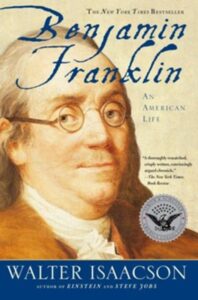
Tesla founder, Elon Musk’s favorite book is about one of the most influential men in history: Benjamin Franklin, An American Life. Musk said that the story of the humble boy who went from apprentice who self-educated himself and became a self-made philosopher and businessman had a big impact on his life.
Sounds familiar…
The book outlines the life of the ambitious urban entrepreneur who rose up the social ladder, from leather-aproned shopkeeper to dining with kings, he seems made of flesh rather than of marble. In best-selling author Walter Isaacson’s vivid and witty full-scale biography, we discover why Franklin seems to turn to us from history’s stage with eyes that twinkle from behind his new-fangled spectacles. By bringing Franklin to life, Isaacson shows how he helped to define both his own time and ours.




